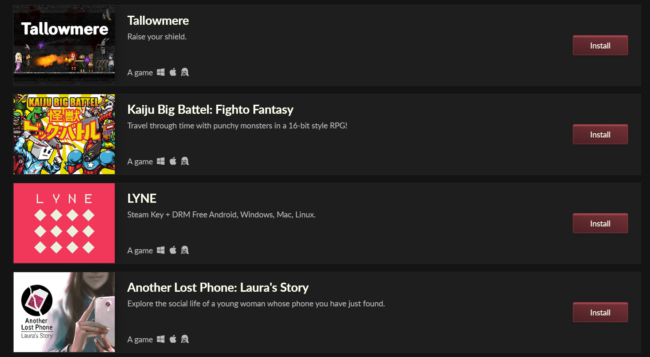itch.io is one of my favorite places to get games, since the revenue splits are the best in the business, the DRM-free versions of games they offer are usually the most consumer-friendly option available, and it’s easier to find games from smaller developers that you might not otherwise have ever encountered. When I first started buying games from itch, I was also very excited by the fact that a lot of developers sold DRM-free Android versions of their games in the form of simple .APKs. However, it quickly became clear to me that this is the exception rather than the rule, as even a lot of games that list themselves as having Android versions are in fact only available for purchase on the Google Play Store (as well as Apple’s App Store, of course).
I am absolutely certain that part of why devs don’t release Android .APKs on itch is because of a fear of piracy. While I would argue (among other things) that piracy is mostly an access/service issue, I won’t deny that there are plenty of people looking to get their hands on Android .APKs of premium apps to distribute for free. That’s also one of the main reasons in-app purchases arose as such a popular monetization strategy, even when an in-app purchase is just for a “premium edition” that could easily be sold as a separate offering on the Google Play Store.
That said, it’s still a bit confusing to me, because I imagine that devs/publishers who most fear piracy would strictly sell their games on Steam while ignoring itch .io entirely. That leads me to a few questions: Does selling a DRM-free .APK hurt a developer’s bottom line that much more than selling a DRM-free Windows executable (or Mac or Linux build)? Or is that a perception that publishers have, which they then use to guide how developers sell their games? If so, maybe there are compromises, such as offering DRM-free .APKs which have updates that are a month behind the Google Play Store versions (security updates notwithstanding)? I can’t imagine that reverse-engineering an .APK for an app that is only available on the Google Play Store is THAT hard for someone who is truly devoted to cracking a game’s release, so it’s hard for me to accept that releasing a DRM-free .APK of your game for your fans to buy is the same as “giving in to the pirates” or something like that.
I also have another proposal for developers that sell multiplatform games: Sell a special “Super Supporter’s Premium Re-Release” of your game that is exclusive to itch.io that includes DRM-free versions of both Windows (and Mac and Linux) and Android builds of your game. I do not claim to be a lawyer or even remotely well-versed in Valve’s Terms of Service or Seller Guidelines or whatever, but my understanding is that there is some restriction whereby a game sold on Steam cannot be sold elsewhere for a permanently different price, which people often bring up in discussions online. If this is the case, maybe this type of special release could serve as a workaround, since it would technically be a different product? While anyone who is adamantly against releasing a DRM-free .APK would never do this, maybe this would be a way to quell some anxieties for devs that are more torn on the issue: This way, they could charge extra for the DRM-free super multiplatform package so that it’s more price accessible on Steam/the Google Play Store but more consumer-friendly otherwise on itch.
At the end of the day, I just think it would be great to get more Android games on itch.io, since that way people could build libraries of Android games without having to resort to using Google’s Play Store (or Google’s Play Games Services). This would benefit anyone who wanted to give Google less money as well as people on alternative releases of Android such as /e/ OS. It would also benefit the devs, who would get a bigger cut than they otherwise would on Google. In the meantime, we can just support the devs who have already done this, with notable games including Super Hexagon and VVVVVV (but unfortunately not Dicey Dungeons), inbento, Hyperspace Delivery Service, and Majesty and its Northern Expansion, among others.


